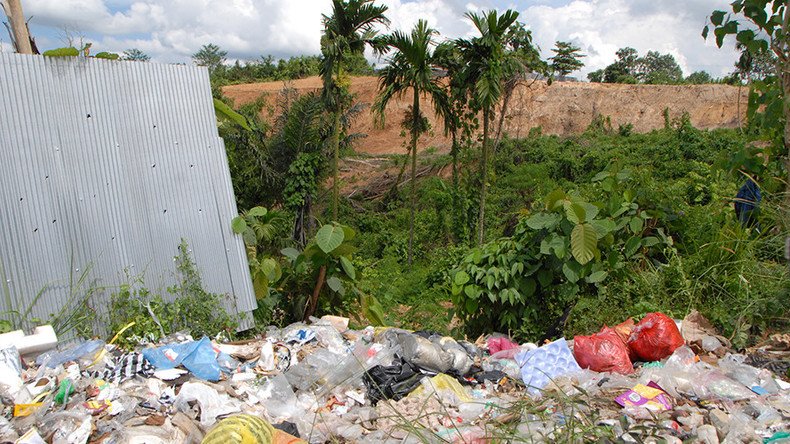Indonesian Borneo is finished: Pollution reaching epic proportions

How destructive can man get, how ruthless, in his quest to secure maximum profit, even as he endangers the very survival of our planet?
The tropical forests of Kalimantan (known as Borneo in Malaysia), the third largest island in the world, have almost totally disappeared. Coalmines are savagely scarring the hills; the rivers are polluted, and countless species are endangered or extinct.
It is all a terrible sight, whether you see it from the air or when driving (or walking) through the devastation that is taking place on the ground. The soil is black; it is often saturated with chemicals. Dead stubs of trees are accusatively pointing towards the sky. Many wonderful creatures, big and small, who used to proudly inhabit this tropical paradise, are now hiding in the depth of what remains of one of the largest tropical jungles on earth
Engines are instantly roaring everywhere; huge equipment is continually cutting through something pure, or digging and finally transporting what has already been extracted, killed, or taken down mercilessly.
Ms. Mira Lubis, Senior Lecturer at Tanjungpura University, Pontianak in Western Kalimantan, summarizes the situation honestly but brutally:
“I think we, the people of Borneo, have lost our sovereignty over our own space and resources, under the pressure of global capitalism... Apparently, we just became poor despite all the wealth that we have.”
One morning I looked from my hotel window in the city of Samarinda (East Kalimantan), spotting an enormous coal barge. It was sitting right in front of me, stubbornly, under the bridge (one of only two bridges connecting two shores of this steamy city of 850,000). The barge was too big to move, as the current appeared to be too strong. One push boat and one tugboat were trying to move it against the torrent, in vain.
I went downstairs and encountered a frustrated Mr. Jailani, a shipping manager employed by a coal company.
“They were supposed to use a pilot boat, but there is none in sight,” he lamented. “This happens so often. Coal barges already hit this bridge on at least three occasions.”
Coalmines were exactly what I was looking for, but he dismissed my questions with a polite but firm answer:
“You can never make it to the mines. They are off-limits. Guards are everywhere, and you’d have to have special permit to enter the area. And there is not much to see, anyway. Our company was recently awarded a prize for environmental consciousness.”
I went to Sambutan, a mining town a 40-minute drive from Samarinda. At some point, continuous and depressing urban sprawl gave way to a fully devastated landscape. Some images were striking: a man, alone, with a metal bar, singlehandedly crumbling the entire side of a mountain, supposedly in order to sell stone for a local construction site.
Nearby, in a makeshift stall, a couple and a child were selling fruit. I asked them about the mountain and the man, and they replied with a certain amount of admiration:
“We are selling coconuts here for almost two years. For as long as we are here, he has been here as well. He is a real daredevil. What he is doing is so dangerous, but he never stumbles, never falls.”
Before Makroman town, we turn left, soon leaving the main road behind. Wherever one looks, the entire landscape is ruined: mountains mutilated beyond recognition, forests gone, and huge tracts of land “cleared.”
Despite what I already witnessed in all corners of Indonesia for years, I’m still not prepared for what soon opens in front of my eyes: the endless and horrifying sprawl of natural calamity: dozens of square kilometers of dust, noise, and mud.
I try to avoid 100-ton trucks which almost run my car off the path. They are transporting coal. I see filthy processing plants. I see old, rusty equipment scattered all around the area.
Suddenly I realize that I’m “there,” in the middle of the notorious ‘PT CEM’ (Cahaya Energi Mandiri), a giant Indonesian-South Korean coalmining joint venture.
I’m not supposed to be here, and to see all this with my own eyes. But I’m entering the mining area with a car equipped with local license plates. It is right before 1pm – the end of lunch hour. Checkpoints are unattended. I step on the gas, and dash in. Guards will soon return, but it will be too late to stop me. My rented car is already cutting through dirt and dust, progressing towards its goal.
PT CEM has operated in this area since 2008, and it counts on mining concessions covering approximately 1,600 hectares, in the area of Sungai Siring, Samarinda.
In Indonesia, the images of natural disasters like this one are hardly ever publicized. Mining in Papua, Kalimantan, Sumatra, and elsewhere brings in billions of dollars annually, into both government coffers and into the deep pockets of corrupt individuals. This country, with the fourth-largest population on earth, is producing very little, but is extracting in an unbridled manner all that is still available above and below the ground. National mass media is fully subservient to both local and foreign business interests.
The native population is stuck with low-paying jobs and almost no benefits. The environment is “changing,” pollution is reaching epic proportions, but there is very little awareness, even among the poorest of the poor, of the dreadfulness of the situation.
On the way out from the mining site, three men (sub-contractors of PT CEM) are trying to fix their broken truck. “The pay here is very low. Our basic salary consists of US$115 per month, which is bellow official minimum wage. We have no health insurance, and no housing allowances.”
In nearby Makroman, Ms. Suwarti, a housewife married to a farmer, explains:
“We have two lots, each with 200 square meters, producing bananas and other crops, but the mining company wanted to use it. They offered compensation of only US$110. If we’d refuse, the company would still grab and use the land, but would give us no compensation. After all, coal that was extracted from our plot, they filled the pit but now nothing can grow there, anymore. The land is ruined. We were very angry, but what could small people like us do?”
It is like this all over the area, all over Kalimantan, all over the entire Indonesian archipelago.
Mr. Yhenda Permana, director of LNG-producing company PT Badak NGL, which is based in Kalimantan, says:
“I’m very sad to see destruction of Kalimantan. If we look from above, the island is already ‘bald,’ dotted with black toxic lakes. They burn the forest with, even with orangutans still living there. Local people do it, but who is behind them? Protected forests are also logged out and burned. Afterwards, in most of cases, palm oil is planted.”
One of the national forests I visited, symbolically named ‘Bukit Soeharto’ (Suharto’s Hill) is almost gone. I ask an old local lady, Ms. Halbi, who is selling basic goods at the side of the road, whether there is any respect for native protected forests on this island:
“We are allowed to grow some plants here. Even I do. Pepper and dragon fruit. It is not our land, but nobody does anything to stop us.”
Stubs and stubs, everywhere, ‘replacing’ magnificent trees, in what used to be one of the greatest areas, often described as “the lungs of the planet Earth.”
Ms. Windrati Kaliman, former lecturer at INSTIPER (Plantation Technology Institute) Yogyakarta, has her theory on the matter:
“Massive deforestation accelerated after ‘de-centralization.’ Now local governments are free to give permits for logging. Rainforest is being converted into palm oil plantations and mines. In theory, protected forests and parks cannot be used for logging, but in reality they are: In Kalimantan, but also in Aceh, Riau, and many other parts of the country.”
It is not only trees that are disappearing, and not only people who are living in increasing misery.
The legendary Borneo orangutan is almost extinct. And so are bears, countless species of birds, and insects.
In Samboja Orangutan Sanctuary & Rehabilitation Center, Mr. Andreas (a caretaker), can barely hide his outrage:
“You cannot imagine what is being done to these intelligent and fascinating apes. This one – we rescued him from a timber plant. Just for fun they had him chained under the generator, for years. As a result, he lost his hearing and suffers from brain damage. It is very common in Kalimantan to hunt for female orangutans, shave them and sell them for sex to desperate forestry workers. It is like rape, like horrible slavery. Remember, these apes have 97% same DNA as humans, and as humans, they have 4 types of blood.”
I travelled through several parts of Indonesian Kalimantan, around Samarinda and Balikpapan, as well as Pontianak. I testify that I saw those “black lakes and rivers,” as well as countless open pits, and palm oil plantations, almost everywhere. I flew over hundreds of kilometers of hellish wastelands. I listened to people suffering from cancer, from respiratory diseases, but above all, from hopelessness.
As Mr. Yhenda Permana concluded: “Can you imagine, this once stunningly beautiful island with deep native forests and thousands of living creatures, is now converted and ‘dedicated’ to only one crop: palm oil?”
The tragedy is not only devastating Kalimantan, but almost the whole of Indonesia. This is what has been happening to this country with a deep and ancient culture, and enormous natural beauty, ever since the 1965 US-sponsored coup, and re-introduction of savage capitalism, feudalism, and unrestrained corruption.
The statements, views and opinions expressed in this column are solely those of the author and do not necessarily represent those of RT.













